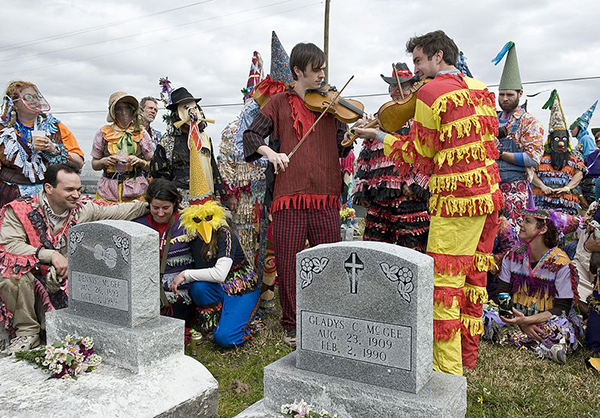Dennis McGee
Dennis McGee was the most influential of all twentieth-century Cajun fiddle players, having directly taught or indirectly influenced three generations of fiddlers.

Wikimedia Commons
Musicians Playing at Dennis McGee's Gravestone, 2009.
Dennis McGee is widely regarded as the most influential of all Cajun fiddle players. Among the first musicians to record Cajun music in the 1920s, he performed at festivals and on college campuses until shortly before his death at age ninety-six. Modern Cajun music is largely defined by two song styles—waltzes in a 3/4 time signature and two-steps in 2/4 or 4/4 time—but McGee was a bridge to the broader range of rural Louisiana French music from the nineteenth century. His earliest recordings testify to his intense proficiency in reels, contredanses, mazurkas, and polkas of the bygone era before the diatonic button accordion of German influence was adopted by Cajun musicians. In his lifetime, he directly taught or indirectly influenced fully three generations of Cajun fiddlers in the complex and intense archaic style of playing that would come to be known, affectionately, as the “McGee style.”
McGee was born on January 26, 1893, at Bayou Marron in rural Evangeline Parish. His father, John McGee Sr., was of Irish ancestry. His mother, Amelia, was half Seminole Indian and half French; she died when her son was only two years old. Growing up outside Eunice on the Cajun prairie of southwestern Louisiana around the turn of the twentieth century, Dennis (pronounced “den-NOOSE” in the Cajun vernacular) learned to play the fiddle from his grandfather, mastering by his teenage years the repertoire of the region’s nineteenth-century French parlor dances. In the mid-1920s, he met Sady Courville, who would soon become his brother-in-law, musical partner, and lifelong friend. McGee married Gladys Courville in 1925; about that time, he and Sady teamed up as a musical duo, with McGee playing the lead and singing while Sady accompanied as the reliable second fiddle. They played weekend dances and recorded together in 1929. Among the first Cajun performers to set their music to 78 rpm disks, McGee would see many of his early songs become standards in the canon of Cajun music as the decades passed.
Virtually all Cajun musicians of the era held regular jobs and performed only as a sideline. After his initial success with McGee, Courville gave up the fiddle altogether to concentrate on his furniture business. McGee went on to record with another early fiddler, his neighbor Ernest Fruge, and performed locally with other musicians, most notably the Black Creole accordion player Amédé Ardoin during a time of strict racial segregation. McGee also put away his fiddle for a time while working as a farmer and a barber, and his musical contributions faded into near obscurity. A revived interest in Cajun culture began to take root in the 1970s, leading to a rediscovery of McGee’s body of work. Before long, he and Courville—both retired by that point—were not only back on the local circuit but also suddenly in demand across the country for music festivals (including the New Orleans Jazz & Heritage Festival), college concerts, and appearances on National Public Radio’s A Prairie Home Companion.
In the late 1980s the University of Southwestern Louisiana (now the University of Louisiana at Lafayette) named McGee an Honorary Dean of Cajun Music. In recognition of that gesture, he performed at the fifty-yard line at a home game for the university’s football team, the Ragin’ Cajuns, with Courville and Michael Doucet, fiddler and songwriter for the Grammy-winning band BeauSoleil and perhaps McGee’s foremost protégé. McGee died on October 3, 1989, and is buried in Chataignier Baptist Cemetery, northeast of Eunice.
